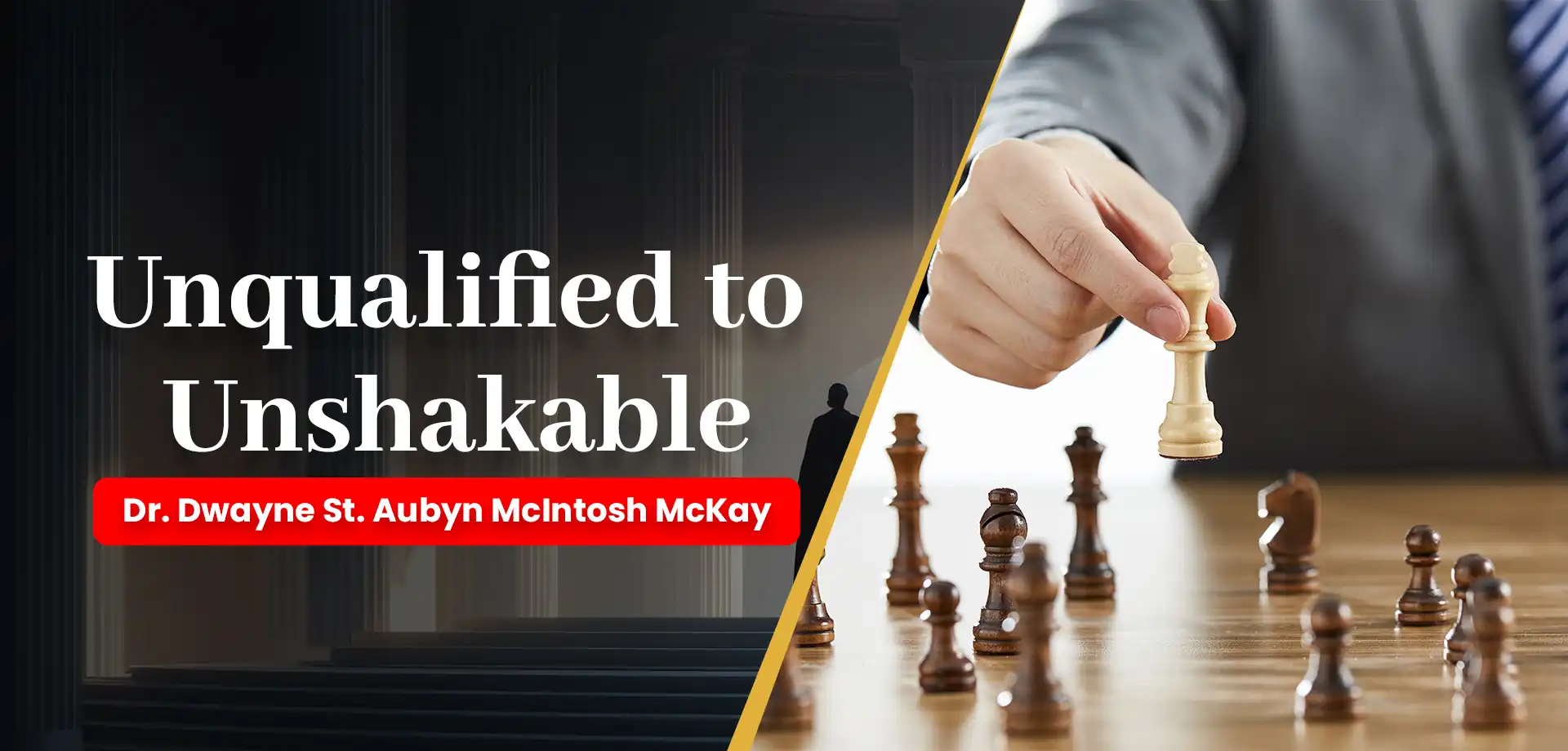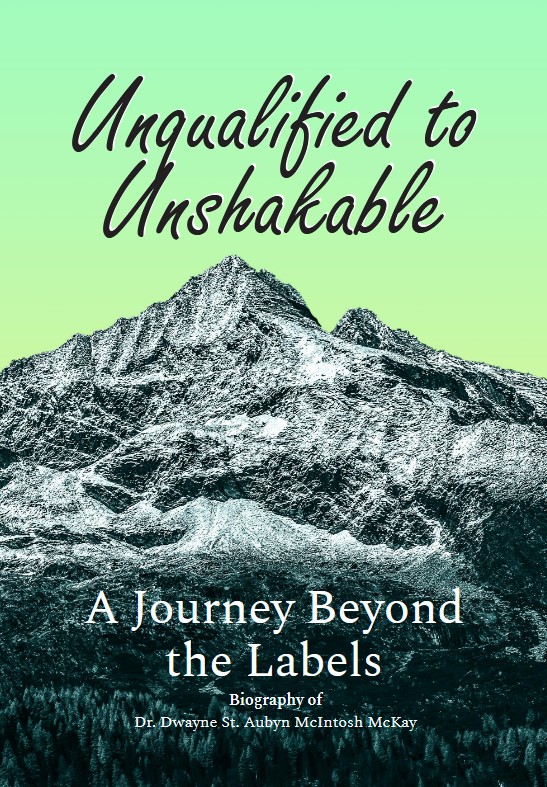

“They said I’d never make it—but I stopped listening a long time ago.”
Introduction
When people see the initials “Dr.” in front of my name, they assume I was always destined for this life. That maybe I was the child who loved books, who topped exams, who showed signs of a prodigy from the start.
I grew up in Westmoreland, Jamaica, in the quiet hum of rural life, where dreams were often smaller than the dust clouds, we kicked up on the dirt roads. My earliest memories aren’t of chalkboards or accolades—but of chicken pens, buckets of water, and a grandfather with fading vision, feeling his way through farm chores with the kind of discipline that didn’t need sight.
That man, my grandfather Stanley McIntosh, took me in when I was just a year old—abandoned by my biological mother, who handed me off without knowing what my future would look like. He raised me with his wife, Vivette, a teacher who would later become an education officer. Together, they gave me what no classroom ever could: grit.
I wasn’t bright in school. Let me be honest—I barely passed. Primary school was a blur of mediocrity, and when it came time for high school, I didn’t even pass the entrance exam. I ended up in a comprehensive school, then managed to transfer to a traditional one, but even then, the victories were few and far between. My Caribbean Examinations? I passed only two subjects at first. Two. It would’ve been easy to stop there. To become another quiet name on a government list. To settle into obscurity. But something in me refused.
I went on to study mechanical engineering—not at a fancy university, but at a Heart Trust NVQJ institution, grinding through Level 1 certification, pushing through days of sweat-stained work, and learning with my hands when my mind was tired. And slowly, painfully, things started to shift. I added more CXC passes. Then came an associate degree. Then a job. Then another.
But life was never linear for me. I had to juggle studies with survival—working night shifts in factories, handling mechanical breakdowns by day and tackling textbooks by night. There were supervisors who demanded I quit school. Moments where choosing education meant choosing hunger. And yet, I kept going.
When one door shut, I knocked on another. Eventually, I transitioned into teaching—not out of choice, but out of a need to find space for growth. I became a high school teacher just so I could finish my bachelor’s degree. That move—desperate as it was—changed the course of my life.
Phase 1 : Humble Beginnings in Jamaica
“I wasn’t raised in privilege—but I was raised in purpose.”
I grew up in the rural pockets of Westmoreland, Jamaica, far from the glitter of city lights or the structure of elite classrooms. My childhood was a patchwork of transfers between schools, missed opportunities, and long walks on gravel roads with holes in my shoes. I wasn’t the child anyone expected to rise. In fact, I wasn’t even raised by my parents.
When I was just a year old, my biological mother handed me over to her father—my grandfather, a quiet, determined man named Stanley McIntosh. He was partially blind from glaucoma, but you wouldn’t know it from the way he ran his little farm. With slow, measured steps, he would navigate the pens, collecting eggs, feeding chickens, tending to pigs—proving every day that vision doesn’t always come from the eyes.
By his side was his wife—my step-grandmother, Vivette McIntosh—a schoolteacher with a heart for discipline and a deep love for structure. She eventually became an education officer, inspecting schools and upholding standards with both rigor and grace. She never sat me down to tell me I had potential. She simply lived in a way that made me want to follow.
But let me be honest: I was never the bright one. I wasn’t a top student. I didn’t read ahead or ace math tests. In fact, I was the kind of child teachers would forget if I missed a day. I did my best, but my best, at that time, never felt like it was enough. I was an average kid in an unforgiving system, and when it came time to take the entrance exam for high school, I failed.
I ended up in a comprehensive high school—a place that didn’t carry the same reputation as the traditional institutions. The students there weren’t seen as gifted. We were seen as leftovers. But even in that space, something stirred within me. A hunger. A resistance. A whisper that said, “You’re more than they think you are.”
After a year, I managed to transfer to a traditional high school. That felt like progress. But the reality didn’t shift overnight. I sat for the CXC exams—and failed most of them. Out of six, I only passed two. And yet, I didn’t stop. I went back the next year and added mathematics to my passing list. That made three.
Phase 2 : The Struggles of Education and Early Industry Life
“Some lessons are learned in classrooms—others are learned covered in grease, working through exhaustion.”
If Phase 1 was about discovering who I wasn’t—not the star pupil, not the child prodigy—then this part of my life was about discovering who I could become. It wasn’t glamorous. It wasn’t easy. But it was real, and it grounded me in ways no academic degree ever could.
After passing just three CXCs and scraping my way into technical studies, I was determined not to let my story end there. My next chapter began not in a lecture hall, but in a workshop, where the sounds of clanging metal and humming motors became the backdrop of my transformation.
I enrolled in Heart Trust NVQJ, a vocational institute offering Level 1 certification in mechanical engineering—the Jamaican equivalent of foundational technical qualifications like City & Guilds in the UK or CVQ in Canada. For many, it was a stepping stone. For me, it was a lifeline. It gave me structure. It gave me a sense of purpose. It gave me my first taste of competence.
I remember the first time I dismantled a gearbox by myself—how my hands trembled, unsure but excited. That machine didn’t just teach me torque or lubrication systems—it taught me confidence. I could do something. I could fix something. And slowly, I started to believe I could fix myself, too.
After completing my associate degree, I started working as a maintenance technician—first at West Best Foods Ltd., then at Jamaica Biscuit Company, and later transitioned into education through a role at St. Andrew Technical High School. Each experience gave me new skills and helped sharpen both my technical understanding and sense of purpose. These weren’t air-conditioned offices or comfortable college campuses. These were environments where you earned your respect through calluses and reliability. Where showing up late meant machines stayed broken and production lines halted.
At Jamaica Broilers, I remember my first full week on the job, being handed a busted pump and told to “make it run again.” No manual. No safety net. Just me, a few rusty tools, and hours of problem-solving. I was terrified. But I didn’t panic. I approached it like a puzzle—and when that pump sputtered back to life, it felt like I had passed the most important exam of my life.
Every repair job became a lesson in patience. Every breakdown was an invitation to grow. But life in the industry wasn’t just physical—it was mental warfare too. I wanted more than bolts and bearings. I wanted to rise, and I knew that meant I had to return to school. So, I started preparing for college.
My days belonged to machines. My nights belonged to textbooks. I enrolled at Caribbean Maritime Institute, this time for an associate degree in industrial engineering. It was one of the boldest things I’d ever done—balancing a full-time job while studying part-time, with barely enough money to cover transportation, let alone tuition.
Phase 3 : Entering the World of Teaching
“I walked away from a job to finish my degree. I had no idea I was walking into my life’s purpose.”
I never planned to be a teacher. If you had asked me years ago whether I saw myself in a classroom, the answer would’ve been no. My focus back then was entirely mechanical—machines, tools, maintenance checklists, and production deadlines. But sometimes life shifts the compass in your hands without asking for permission. That shift came the day my supervisor in the factory gave me an ultimatum: either quit school or quit the job.
At the time, I was working long hours in industry, trying to juggle shift work while pursuing my Bachelor of Engineering in Industrial Systems. It was a balancing act I held together with tired limbs and silent prayers. The tension between work and school became unbearable. My supervisor didn’t understand why education mattered so much. He wanted me on-site during the day. He didn’t care about my evening classes. When he told me to stop going to school, I knew I had to walk away. Not because I had another offer lined up, but because deep down, I believed that investing in myself would eventually pay off.
That leap of faith landed me in front of a chalkboard, holding a piece of white dust like a microphone, staring into the eyes of teenagers who reminded me of a younger version of myself. St. Andrew Technical High School became my proving ground. I was brought in to teach Mechanical Engineering at the secondary level, handling grades 7, 9, and 10. It was a temporary two-year contract, replacing a teacher on leave. Nothing permanent. Nothing fancy. But it was the first time I stepped into a room not to fix a machine—but to build a mind.
Teaching high school students is a dance between patience and performance. They test your limits before they trust your lessons. But I found my rhythm by doing what came naturally: I told them the truth. I shared my failures, my factory shifts, the nights I couldn’t keep my eyes open after class. I told them how I barely passed my subjects. How the system wasn’t built for people like me. But how I kept going anyway.
I realized quickly that what students crave more than perfect answers is authenticity. They didn’t want a lecturer with polished slides and rehearsed lines—they wanted someone who had lived what he taught. I gave them that. Every day, I entered the classroom with honesty, passion, and a reminder that their current situation didn’t define their potential.